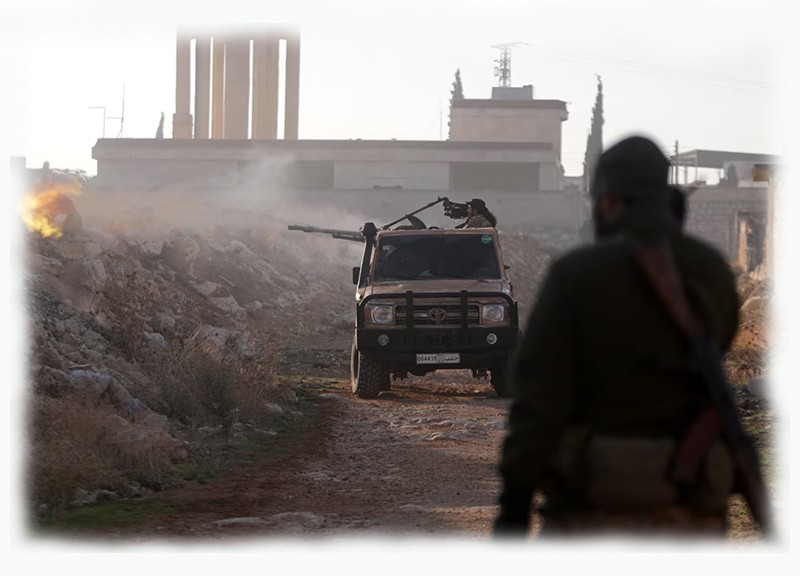
The loss of Aleppo to Islamist rebels represents a stunning defeat for the Syrian regime, highlighting its dependence on enfeebled allies
By Yaroslav Trofimov. WSJ.
It had taken the Syrian regime and its backers—Iran, Russia and Hezbollah—more than four years to dislodge rebel forces from the country’s second-largest city of Aleppo. At the time, in 2016, they celebrated that victory as the turning point in Syria’s civil war.
Now, a surprise rebel offen-sive has recaptured Aleppo in just a few days, the direct consequence of new wars outside Syria's borders.
"Regional and international powers intervened in Syria over a decade ago, and now the conflicts of Ukraine, Gaza and Lebanon all come together and overlap in Aleppo," said Andrew Tabler, a senior fellow at the Washington Institute for Near East Policy who served as Syria director in the Trump White House.
Lebanon's Hezbollah militia, Russian President Vladimir Putin and the Iranian ayatollahs' regime are all embroiled in conflicts that threaten their survival. All three have sustained strategic blows-and the Syrian rebels' main backer, Turkey, has taken advantage.
"Russia is weakened, Iran is weakened, Hezbollah is beaten-and all this has created an enormous opportunity for Turkey, which it was quick to grab," said Asli Aydintaşbaş, a Turkey specialist at the Brookings Institution.
At the very least, the latest developments will stem the flow of Syrian refugees into Turkey, a significant political problem there.
Syrian President Bashar al-Assad has tried to keep a low profile since the Oct. 7, 2023, attack by Hamas turned into a regional war between Israel, Iran and Iranian proxies. Yet, that maneuvering didn't prevent Assad's regime from getting embroiled in the maelstrom that is reshaping the Middle East.
Aleppo's fall on Friday night exceeded the Islamist- led rebels' wildest expectations. Now, after the regime's army collapsed or fled, other offensives are under way. Fighting in coming days will show whether the Syrian military will be able to regroup and counterattack-or will continue a chaotic retreat.
The most important factor behind Assad's loss of Aleppo is the rout inflicted by Israel on Hezbollah. Equipped by Iran and Russia, the Lebanese militia used to be the most capable infantry fighting on Assad's behalf.
But, in October last year, Hezbollah's leader Hassan Nasrallah made a strategic mistake, joining the war against Israel that was kicked off by Hamas. Israel killed most of Hezbollah's senior leadership, including Nasrallah himself, decimated the militia's ranks and destroyed its weapons caches. It forced Hezbollah, which had pledged to keep fighting until a full Israeli withdrawal from Gaza, into a separate cease-fire.
"Hezbollah is crippled," said Navvar Şaban, a researcher on Syria at the Harmoon Center for Contemporary Studies in Istanbul. "This has created a huge vacuum. Though there were regime forces located in Aleppo, they were not trained, they lacked military discipline, they lacked tactics and even their retreat plan was a disaster."
Since the Gaza war began, Iran, too, has lost some of its top Revolutionary Guard commanders in Syria and Lebanon to Israeli airstrikes. Instead of projecting strength, Iran's retaliation against Israel resulted in the Israeli bombing of Iranian air defenses and weapons-production facilities. This was a blow to Tehran's military power and political prestige alike.
For Russia, the 2015 intervention to rescue Assad's regime was advertised as a geopolitical triumph that displaced the U.S. as the Middle East's sole dominant power. Then came the 2022 invasion of Ukraine, which has turned into a bloody war of attrition. The Russian air force hasn't been as degraded as Russian ground troops in Ukraine, but it operates at a fraction of its former strength in Syria.
It carried out bombing runs in Syria in recent days, but the strikes didn't do much to halt the rebel advances.
The current rebel offensive in Aleppo was led by the Hayat Tahrir al-Sham, or HTS, an Islamist militia coalition that enjoys Turkish backing. Its key leaders include Islamist fighters once associated with the Nusra Front, a onetime Syrian affiliate of al Qaeda. Though the HTS leadership has publicly disavowed al Qaeda, the group remains classified as a terrorist organization by the U.S. government.
In an effort to avoid the mistakes of the past and project the image of moderation, HTS military commander Abu Mohammad al Jawlani urged his Sunni Islamist followers to avoid harming Shiites and other minorities, and to maintain order in the city.
While the HTS rebels-and their Turkish patrons-benefited from the Israeli strikes on Hezbollah and sites in Iran and Syria, the timing of the Aleppo offensive was likely tied to the cease-fire just reached in Lebanon.
"The militants have been ready for a while. And my guess is it's the Turks who have been holding them back," said Robert Ford, a former U.S. ambassador to Syria and a fellow at the Middle East Institute. "But now, once the Lebanon cease-fire is done, the attack on Aleppo doesn't look anymore like Turkey fighting an enemy of Israel."














